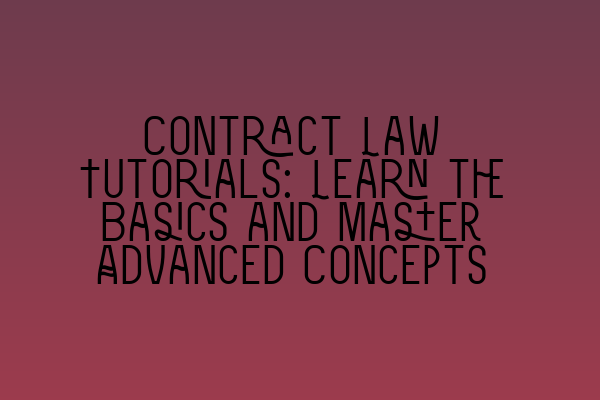Contract Law Tutorials: Learn the Basics and Master Advanced Concepts
Contract law is an essential area of study for aspiring solicitors and legal professionals. Understanding the fundamentals of contract law and mastering advanced concepts is crucial for success in this field. Whether you are preparing for the SQE exams or seeking to enhance your knowledge, this tutorial will provide you with a comprehensive overview of contract law.
The Basics of Contract Law
A contract is a legally binding agreement between two or more parties. It involves an offer, acceptance, consideration, and an intention to create legal relations. To learn the basics, it is important to understand the key elements of a contract:
- Offer: An offer is a proposal made by one party to another, indicating a willingness to enter into a contract.
- Acceptance: Acceptance is the unqualified agreement to the terms of an offer. It creates a legally binding contract.
- Consideration: Consideration is something of value exchanged between the parties. It can be money, goods, services, or a promise to do or not do something.
- Intention to Create Legal Relations: Both parties must have an intention to create legal relations and be bound by the terms of the contract.
By understanding these essential elements, you can identify and analyze the key elements of any contract.
Mastering Advanced Concepts
Once you have grasped the basics, it’s time to delve into the more complex aspects of contract law. By mastering these advanced concepts, you will be better equipped to handle intricate legal scenarios. Here are some advanced topics to explore:
1. Contract Formation and Validity
Understanding the different ways contracts can be formed and the requirements for a valid contract is crucial. This includes exploring concepts such as offer and acceptance, consideration, intention, and capacity.
2. Contract Terms and Construction
Contract terms define the rights and obligations of the parties involved. Learning how to interpret and construe contract terms is essential. Key topics to explore include express terms, implied terms, conditions, warranties, and innominate terms.
3. Vitiating Factors
Contractual agreements can be affected by vitiating factors that render them voidable or invalid. Studying vitiating factors like misrepresentation, mistake, duress, undue influence, and illegality will enhance your understanding of contract law.
4. Discharge and Remedies
Contracts can be discharged in various ways, such as through performance, frustration, breach, or agreement. Learning about the different methods of discharge and available remedies for breach of contract is crucial for effectively advising clients.
5. Agency and Third Party Rights
Understanding the rights and liabilities of agents and principals, as well as the concept of privity of contract, is important. Explore the law on agency relationships and how third parties can acquire rights under a contract.
Preparing for the SQE Exams
If you are preparing for the SQE exams, it is essential to have a solid understanding of contract law. To enhance your preparation, you can consider taking SQE 1 preparation courses and SQE 2 preparation courses, which will provide you with comprehensive study materials and practice exams.
Additionally, practicing with SQE 1 practice exam questions and SQE 1 practice mocks FLK1 FLK2 will help you familiarize yourself with the format and structure of the exams. Being well-prepared and confident in your contract law knowledge will greatly increase your chances of success.
Stay Updated with the SRA SQE Exam Dates
The Solicitors Regulation Authority (SRA) sets the exam dates for the SQE. Keeping track of these dates is crucial for planning your exam preparation and ensuring you are ready on time. Stay informed about the latest SRA SQE exam dates to avoid any last-minute surprises.
Contract law is a fascinating and dynamic area of study. By learning the basics, mastering advanced concepts, and preparing thoroughly for the SQE exams, you can ensure a solid foundation in this essential field of law.
For more information, check out these related articles:
